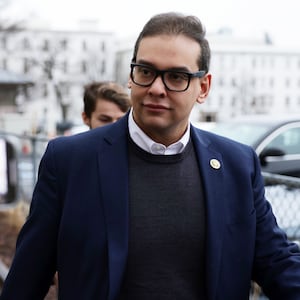Pay Dirt is a weekly foray into the pigpen of political funding. Subscribe here to get it in your inbox every Thursday.
In his brief stint on the national stage, Rep. George Santos (R-NY) has spun some of the most preposterous fictions of any U.S. political figure in modern history. So when Santos listed a new treasurer that no one in this insular world of campaign finance had ever heard of—with the innocuous name “Andrew Olson”—some campaign finance experts wondered if Santos could have invented a person.
It wouldn’t have been his most obscene lie.
At the time, Santos was under immense pressure. His lies and troubled campaign finances were daily headlines and multiple law enforcement agencies had already launched investigations into both him and his campaign. The pressure prompted his longtime campaign treasurer, Nancy Marks, to resign just before new reports were due and her supposed replacement—professional Republican political treasurer Tom Datwyler—had allegedly just rejected the opportunity to file those dubious records under federal scrutiny.
Under the gun to file a batch of fundraising reports, the embattled New York congressman pulled a rabbit out of his hat. Within days, he found someone who was somehow able to process all of his year-end fundraising and spending for multiple political committees, match it with other reports, get it in under the Jan. 31 deadline, and sign off—under penalty of law—that the reports were accurate.

But that person—Andrew Olson—was a ghost. Experts were baffled and skeptical in interviews. No one had ever heard of a political accountant by that name. His supposed gmail address—apolson1964—offered tantalizing biographical clues that didn’t return any clean matches in the United States, and Santos himself didn’t offer much clarity.
Given the available information, veteran watchdog group Citizens for Responsibility and Ethics in Washington took the unprecedented step of filing a Federal Election Commission complaint alleging that Olson, like so much of Santos’ life, might be a fugazi. They hoped to establish that either Olson was real and responsible for what was in those reports, or that Santos was piling on even more deception.
The Daily Beast can now report that Andrew Olson is, in fact, a real human being. But he’s fake in another respect: He’s not actually a treasurer.
The nature of reality
Jordan Libowitz, communications director for CREW, said Olson’s role does not seem to have been real.
“Andrew Olson is a real person, but ‘Santos Treasurer Andrew Olson’ does not appear to be,” Libowitz told The Daily Beast, wondering whether Olson knew at the time that Datwyler had used his name, or if he had permission.
This is the wild story of how Olson went from an account manager at a Minneapolis power tool retailer to simultaneously gracing some of the most notorious and legally dicey campaign-finance ledgers in the country unscathed.
That is, nearly unscathed.
In reality—according to internal campaign communications, legal experts, state and federal filings, and multiple people familiar with the events—Andrew Olson appears to have simply been a front for the real accountant, a favor that Olson has actually performed multiple times before to help out a close friend. That friend also happens to be one of the most in-demand professional accountants in GOP politics: Datwyler, the same person who claimed to have turned Santos down.
Saurav Ghosh, director of federal reform at Campaign Legal Center, told The Daily Beast that he was surprised at the news, but upon hearing the full story said, “the truth is even stranger than that fiction.”
“Santos was under a lot of scrutiny and a lot of pressure, and we basically knew there was something deeply wrong with his reports and we all thought that in a desperate move that George Santos made someone up,” Ghosh said.
As it turns out, Datwyler—who had previously denied accepting the Santos gig—actually appears to have taken Santos as a new client. But, as Ghosh put it, he took the gig “in the most duplicitous way possible.”
“I don’t know if that makes Datwyler the George Santos of treasurers, but it doesn’t make him a good person or honest in any way,” Ghosh said.
Ghosh and other legal experts interviewed for this story raised the possibility that Datwyler—and possibly other Santos handlers—could face some level of exposure for their actions.
Dan Weiner, a former FEC attorney and director of elections and government at the Brennan Center for Justice, wondered whether the federal forms misrepresented the arrangement.
“The most basic thing is you can’t lie on a form to the FEC,” Weiner said, noting that the treasurer’s role as record-keeper is critical to a campaign’s integrity. “If you’re holding someone out to be your treasurer and they’re not actually doing it, that’s a problem,” he said. “We’d need more facts to know if they broke any laws, but this is indicative of a serious concern.”
Ghosh also ominously noted that Marks, Santos’ original treasurer, just pleaded guilty to filing false statements this month.
Amended reports
Whoever handled the reports between January and May of 2023 did so while parsing the campaign’s nearly incomprehensible accounting at high legal risk—and reported no payments for that work. One filing in particular reflects the true treasurer’s confidence: the campaign’s report from this April, which entirely reconfigured the dates and amounts of hundreds of thousands of dollars that Santos claimed to have loaned his campaign.
While that filing mystified experts at the time, the radical shifts in the loans aged well, because they showed ahead of time what the world learned in court filings just this month—that Santos and Marks worked together to fake a $500,000 loan.
That loan was first removed in the April report, and the filing added an entirely new set of loans later in the year, also in keeping with new reporting.
The Daily Beast reached out to Olson and Datwyler with detailed questions, but didn’t receive a reply. In a brief phone call, Olson said he likely wouldn’t respond to questions. Lawyers for Marks and Santos both refused comment.
Santos himself, however, confirmed the general arrangement. Speaking with The Daily Beast on Tuesday, the truth-challenged legislator asserted that Datwyler’s public repudiation of his campaign position was all a show—and that Datwyler had offered Olson as a stand-in.
“Thomas agreed to be the treasurer, then when he started getting heat from clients, he made up that entire story that ‘Oh no, I never agreed,’” Santos asserted, claiming he did not push back on Datwyler’s public protestations at the time because he needed his services. “He then turns around and says, ‘No, one of my associates is going to be the treasurer, but we all work together and we’ll all take care of it.’ And that’s how Andrew Olson came about.”
Santos said he never spoke with Olson, and only ever exchanged a single email with him. Instead, he insisted he “dealt 100 percent” with Datwyler, though he added that an address for Olson was CC’d on all their correspondence, and that he genuinely believed the substitute treasurer was a partner in the money manager’s firm.
But if Datwyler made that claim, it wasn’t correct.
ASL
Olson was not a “partner” at Datwyler’s firm, 9Seven consulting. The email contact that Olson provided to Santos’ team, according to correspondence reviewed by The Daily Beast and people with knowledge of the events, was not a 9Seven email address. It was the same email Olson listed when Datwyler had swapped him in as treasurer for state-level PACs, with a domain suggesting Olson worked for a firm called “OK Consulting Group.”
The Daily Beast could not immediately tie Olson to any extant company with that name. An Oklahoma entity by that name was dissolved in 2019, according to state records; and a Minnesota entity by that name dissolved in February, around the time of the treasurer switcheroo.
Instead, Olson’s LinkedIn profile—and his cellphone caller ID—show that he’s an account manager for a power tool manufacturer. He’s also not 59, as his apolson1964 Gmail address suggests, and his middle name doesn’t start with a P.

Olson is 35 years old. He lives with his wife in western Wisconsin. Before that, he was a sales representative for an industrial plastics supplier and a marketer for the Oklahoma City Dodgers, a triple-A minor league baseball team. And his main qualification for the job appears to be his friendship with Datwyler, whom he’s known since at least high school and who lives nearby.
It’s a tale that probably only George Santos could tell—though Santos declined to provide any documentation to back up his assertions. The story that The Daily Beast uncovered ranges across the United States, crosses the partisan divide, and touches upon a dark money machine feeding unsourced cash to state races across the country. It plays out as a stupefying run of errors, gaffes, confusion, and misdirection that could, on some level, give Santos a run for his money. And somehow, because of course, Mike Lindell is involved.
At the core of the matter, however, is Santos himself. The story of Andy Olson is also the story of just how monumentally messed up the Santos campaign’s financial claims have been, and what secrets they could still be hiding.
In the larger view, it’s the story of why it’s sometimes so difficult to make sense of the origins, purposes, and movement of the money upon which American democracy feasts—and who stands to benefit most from that systematically supercharged murk.
Olson—wittingly or not—was somehow convinced to put his name on disastrously unreliable reports from a campaign that was under scrutiny from multiple law enforcement agencies. Months later, the campaign’s reporting led the previous treasurer to plead guilty to a federal crime.
It all came out in the wash this weekend, with a new Santos campaign filing that disclosed some bizarre payments to a prominent Republican political attorney.
When the campaign filed that financial statement on Sunday, it wasn’t surprising to see tens of thousands of dollars in legal expenses. After all, Santos had just days before been hit with a second federal indictment, which laid out a number of new alleged campaign finance crimes.
But those legal fees also shed some light on the identity of his secret campaign accountant.
Spy vs. Spy
First, the lawyer Santos paid is not some neophyte outsider; he’s a well-known GOP attorney and political operative named Charlie Spies, the Republican National Lawyers Association 2023 Lawyer of The Year.
While Spies doesn’t appear by name on Santos’ campaign expenses, his firm—Dickinson Wright—does. The Daily Beast has also reviewed internal communications showing that Spies played a key but so far unreported hands-on role behind the scenes, which sources with knowledge of the arrangement corroborated.
The Santos campaign previously paid Dickinson Wright relatively small monthly retainers for legal and compliance consulting—that is, for making sure the campaign was operating in harmony with federal regulations. (It was not.)
Between September 2021 and December 2022, the firm took in about $40,000 from the Santos campaign, FEC records show. The expense descriptions covered a small range of services, mostly related to legal and compliance, with some political consulting as well. But while Spies was the team’s legal point man, it’s still unclear how he first linked up with Santos—and it’s unknown why the institutional Republican didn’t join the wave of Santos allies who broke ties after he was exposed.
After The New York Times first exposed Santos as a serial liar to a national audience last December, the Dickinson Wright payments stopped showing up in the campaign’s expenses. But Spies apparently kept working for the campaign without getting paid, according to internal communications and sources with knowledge of the interactions. The scope of that work is unclear, but a Jan. 17 email shows Spies communicating on behalf of the campaign to its old treasurer, Nancy Marks, quarterbacking the transition to Datwyler.
“The Santos campaign has engaged a new Treasurer—Thomas Datwyler—who is ready to replace Ms. Marks as Treasurer for the campaign,” Spies wrote to Marks’ attorney, Ray Perini.
By May, The Washington Post reported that Dickinson Wright—which had been representing Santos in connection with FEC and congressional inquiries—had dropped him as a client.
On Sunday, however, the Santos campaign—which in May finally replaced Olson with professional GOP treasurer Jason Boles—reported its first new payment to Dickinson Wright. It was a flat $20,000, in July, for “legal” services.
It wasn’t for work done in July. In fact, going by the filing, it’s unclear when exactly Spies performed the services Santos was paying him for, or what those services were. That’s because this wasn’t a new payment—the campaign was actually paying down an old debt that the campaign, for some reason, had been accruing but not disclosing while Andrew Olson was signing its reports.
The $20,000 was the first installment towards nearly $90,000 in debt to Dickinson Wright. The current treasurer, Boles, explained in the payment description, “(TREASURER BECOIME [sic] AWARE OF PRIOR DEBT IN CURRENT PERIOD).” Two days before the July 17 payment, Boles filed the campaign’s previous quarterly report and then an amended version. Both versions showed no debt, and not enough cash on hand to cover the roughly $89,000 allegedly owed to Dickinson Wright. They also show the campaign paid Santos $85,000 on May 30, the day his campaign first paid Boles.
Boles declined to comment for this report. Santos refused to remark on the state of his relationship with Dickinson Wright, citing unspecified legal issues. The Daily Beast emailed detailed questions to Spies, but did not receive a reply.
Unpaid debts
Upon closer inspection, it gets even weirder. While the payment was made to Dickinson Wright by name, the address was for a different firm—a Hudson, Wisconsin, P.O. box belonging to 9Seven Consulting, which is Datwyler’s firm.
Datwyler has been in the business of politics for the past decade and a half, first interning for the Republican National Convention in 2008 and subsequently cutting his teeth as an operative for controversial ex-Minnesota Rep. Michele Bachmann. After the 2018 midterms, he began showing up in FEC filings as the money-manager for such GOP powerhouses as Sen. Mike Lee (R-UT) and Rep. Jim Jordan (R-OH).
The Badger State native has also run into repeated trouble with the FEC. Last December, the electoral overseer found Datwyler hadn’t properly reported $147,601 in contributions to failed Senate candidate Josh Mandel. Mandel’s team explicitly blamed Datwyler for the violations.
The FEC has also whacked Datwyler for missteps with a number of other clients, including Rep. Rick McCormick (R-GA), Rep. Rodney Davis (R-IL), and extremist MAGA candidate Joe Kent.
Meanwhile, Mississippi Attorney General Lynn Fitch over the summer announced a criminal probe into a political action committee Datwyler ran in the Magnolia State over potential campaign finance violations.
It’s unclear why the Santos campaign would pay its own law firm, Dickinson Wright, at the address of Datwyler’s entirely separate accounting firm. The campaign didn’t do that in previous Dickinson Wright payments.
The substantial debt to Dickinson Wright appears to have accumulated on Andrew Olson’s watch—and Datwyler’s—but went unreported at the time. The firm doesn’t appear among the several debts that Marks disclosed on her last filing, from late 2022, while the campaign was still paying Dickinson its monthly retainers, and before Santos came under investigation. (Those other debts somehow vanished in Olson’s first filing.)
Brendan Fischer, a campaign finance law specialist and deputy executive director of Documented, said that he couldn’t make sense of who was truly getting paid—the law firm, Datwyler, or possibly both.
“These facts raise questions about whether any of the funds in the reported disbursements to the law firm are actually disguised payments to Santos’s off-the-books campaign treasurer,” Fischer told The Daily Beast.
“The legal issues would be compounded if debts are indeed secretly owed to Santos’s former de facto treasurer,” Fischer said, referencing the Datwyler/Olson duo. “The treasurer is ultimately responsible for filling out an accurate report, and while mistakes and oversights happen, a treasurer surely knows what he is owed by the campaign. It is hard to see how a treasurer’s failure to report debts owed to himself could be a mistake.”
But it was Datwyler who appears to have actually taken the treasurer reins—just under the guise of Olson.
There goes my hero
According to multiple people familiar with the chaos, Datwyler appears to have swapped Olson—an old classmate from Wisconsin’s Hudson High School who once called Datwyler his “hero”—in place of himself. At least, in name.

In late January, when new Santos filings first named Datwyler his treasurer, Datwyler quickly denounced them as false, with several national outlets, including The Daily Beast, citing denials provided through an attorney. (Datwyler’s team went so far as to ask FEC investigators to refer potential crimes to the feds.)
After the Datwyler news broke, Santos had one day to submit his next campaign filing. But Santos wasn’t stuck long. He managed to locate a new treasurer—Olson—who despite having no clear professional financial credentials or political experience, was apparently able to process the campaign’s raising and spending and file and sign the report on time.
And this isn’t the first time Datwyler and Olson have pulled this act.
Where the wind comes sweeping down the plains
While Olson’s name doesn’t show up on any other federal political committees, he does appear on three Datwyler state-level committees. One of them is in Minnesota and two are in Oklahoma, where Olson once lived. The email address Olson supposedly provided to the Santos team still reflects his Sooner days, with the domain of “ok-consulting.group.”
Oklahoma law mandates that a political committee’s treasurer reside in-state, and public records show Olson and his wife lived in the small city of Yukon at the time the Integrity Oklahoma PAC formed in 2021. The committee’s registration listed Olson as treasurer—but lists Datwyler’s phone number and email address as its contact information, even though Datwyler’s name doesn’t appear anywhere in the filings.
Datwyler and Olson both appear on the formative documents of the Sooner Greatness PAC created in Oklahoma in May of this year, with Datwyler as chair and Olson as treasurer. This PAC’s registration also presents Datwyler’s professional phone and personal Gmail as its points of contact.
Both of Olson’s Oklahoma PAC registrations cited the same physical address in Yukon, Oklahoma. That is Olson’s old house, which according to Canadian County property records he and his wife sold on April 14, 2022. Olson, still the treasurer, signed that document.
Today, however, Olson is registered to vote at the home he and his wife purchased last July in Roberts, Wisconsin—though Olson’s Oklahoma voter registration remains active.
The purpose of these groups is unclear.
Integrity Oklahoma was open for about a year. In that time it got exactly one donation—a $25,000 contribution a month after it was formed, from Tulsa resident and QuikTrip convenience store chain co-founder Burt Holmes.
Holmes is a prolific and generous Democratic donor who told The Daily Beast in a phone interview that he supports progressive causes. He is also 92 years old. Although he’s still sharp, Holmes said he could not recall this particular 2021 gift.
Integrity Oklahoma appears to have done two things with that cash: pay Datwyler, and kick the rest to a murky conservative political nonprofit that sluices untraceable donations into races across the country.
When The Daily Beast told Holmes what happened to that donation, he wasn’t happy.
“I’m very upset about that,” Holmes said. He added that he “did not intend for my money to go to a right-wing group,” and is unclear on how he would have been convinced to make that donation—let alone the group’s only donation.
Datwyler’s firm received about $3,500 for compliance services to the PAC—even though that required almost no work at all. Then, on the PAC’s last day, it transferred its remaining $21,499 to the American Exceptionalism Institute.
Libowitz remarked that the Oklahoma groups pose “an even bigger mystery” than Olson’s involvement with Santos.
“With Santos we at least know the why,” he explained. “But why form a group only to solicit a single disclosed donation and pass it along?”
Part of the answer may be found in the dark money network.
Dark dollars
Days later, AEI donated $75,000 to “American Jobs and Growth,” a super PAC which helped fund yet another super PAC—based in Maryland—that was backing Oklahoma Republican congressional candidate Avery Frix.
AEI contributed to several Oklahoma races that year, but the dark money group drew scrutiny in 2023 when it was at the center of a campaign finance scandal in the Mississippi lieutenant governor’s race. The scandal forced GOP state Sen. Chris McDaniel to shut down a PAC alleged to be in violation of state law and return $460,000 in contributions that the PAC shuffled his way from AEI. The PAC’s treasurer? Tom Datwyler.
Months after the group closed down, Datwyler put his name on another out-of-state super PAC in that same Mississippi race, whose donors included the same two super PACs that had backed Frix in Oklahoma. In August, that PAC—called “Invest in Mississippi”—came under criminal investigation, having put twice as much money into the race as Datwyler’s first PAC.
This month, Datwyler shut the second group down. Its termination report leaves all fields blank, not disclosing how much the group raised or spent. Datwyler’s name is on the form, but the treasurer’s affirmation—below the phrase, “I certify that I have examined this report and to the best of my knowledge and belief it is true, accurate, and complete”—was left unsigned.
Weiner, of the Brennan Center, said this kind of maneuvering dissolves the “artificial distinction” between regulated and unregulated political groups.
“It’s hard for regulators to keep the world of ‘hard money,’ with its limits and transparency, separate from the universe of ‘soft money’ and unregulated money,” he said. “That puts a burden on agencies, and the artificial distinction between the money they can limit and the money that they can’t just ultimately breaks down.”
Hot dish
Datwyler was also the focus of another recent state-level campaign finance investigation. This one was in Minnesota—and it involved Olson.
The Daily Beast obtained the case file of that investigation from the Minnesota Campaign Finance Board. The probe centered on alleged coordination between GOP attorney general candidate Doug Wardlow and an aligned super PAC called “Rescue Minnesota.” It ended with a conciliation agreement where Rescue Minnesota—and Andrew Olson, the PACs stated treasurer—admitted unlawful coordination and paid a fine.

Datwyler was Wardlow’s treasurer for several months when he registered a super PAC that launched ads supporting Wardlow in June 2022. He listed himself as treasurer—a prohibited dual role. (Datwyler denied providing inside information for the ads in his statements to investigators.) Datwyler scrubbed his name from both groups. In his place, Jason Boles, the current Santos treasurer, took over Wardlow’s operation, and Olson’s name—fresh off of his first Oklahoma PAC side hustle—appeared on the super PAC.
This time, Olson used his personal Wisconsin address, with the town’s name misspelled. And while the filings listed his OK Consulting Group email, they had a different phone number—with a Maryland area code—which The Daily Beast was unable to tie to any person or group. That same Maryland number was also provided to the Santos campaign, allegedly by Olson. (When The Daily Beast called the number, it went to voicemail without ringing; questions sent to the email address were not answered but did not bounce back.)
Like Integrity Oklahoma, Rescue Minnesota led a brief and wondrous single-donor life—kicking 20 percent of its money to a top Donald Trump aide and plowing almost everything else into what turned out to be illegal ads, according to the conciliation agreement.
The group’s first filing under Olson’s name, in July 2022, shows one contribution—$50,000 from the state’s leading right-wing pillow salesman, Mike Lindell. That day, Rescue Minnesota paid $10,000 for “consulting,” incorrectly listing the recipient company as “Fundraising Consulting,” which had a New Jersey address tied to top Trump adviser Boris Epshteyn.
Asked about the donations, Lindell told The Daily Beast in a text message conversation that he had “no idea.”
“I wanted to help Doug Wardlow,” he wrote, adding that “it was probably Boris Epshteyn that reached out to me but I am not 100% sure.” He did know that the money was intended to fund ads.
The next and final report, in September, shows another $50,000 from the pillow king and another $10,000 going out the door for consulting—this time to Epshteyn’s proper company, Georgetown Advisory. Another $1,000 went to 327 Consulting, the previous name of Datwyler’s company. The rest of Lindell’s cash funded radio and social media ads produced and purchased by Republican firm Strategic Media Placement.
By then, the Minnesota Campaign Finance Board was investigating the alleged coordination.
It takes two
The Daily Beast obtained records of that investigation from the campaign finance board. They include email correspondence with Olson’s OK Consulting address, though the investigator who handled the case told The Daily Beast that he had only communicated with Olson in writing.
“To the best of my recollection I have not spoken with Andrew Olson by telephone,” the official wrote in an email to The Daily Beast. “It is possible that I left a voicemail for Andrew Olson at some point during the investigation, but I believe that we otherwise only communicated by email and mail.”
In one snapshot of that correspondence, on Nov. 29, 2022, Olson—who had already supposedly submitted two filings under his name—reached out to his contact for the investigation. He wanted to know how to file a report.
“I was wondering if you could help me with a question?” Olson wrote. He needed to submit an amended filing in order to reclassify the PAC’s media buys.
“Do you know how I do this in CFR?” he asked, referring to the state’s campaign finance reporting software.
Olson also provided responses to investigators, sent from his OK Consulting address, which had clearly been written by someone versed in the law. The reply also lectures the campaign finance board about the habits of full-time professional treasurers, noting that “it is commonplace for professional treasurers, such as Mr. Datwyler, to provide treasury services for a political committee and not know at the outset which candidate(s) the political committee will support or oppose,” Olson wrote.
Olson—or the person purporting to be Olson—added that document as an attachment to an email and sent it to the legal analyst that had been assigned to his case. It was the same person whom Olson later asked for advice on filing an amended report.
That legal analyst’s name—coincidentally—was Andrew Olson.










